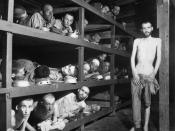Chloe Hayward 23rd May 2014
Literary Documented Argument DeChick 1BD
Kenneth Waltzer once said, "Any memoir is a reconstruction shaped by purpose and audience rather than a direct statement of memory - and even (Elie) Wiesel's Night is not an exception." I agree with Waltzer in that the construction and telling of a memoir is influenced by many things, including purpose and audience, as well as perception, and the fact that a memoir isn't, and shouldn't be, looked at as an accurate rendition of the past, but rather a personal account of one's fragmented memories. This message is apparent in the memoirs, Night, by Elie Wiesel, A Long Way Gone: Memoirs of a Boy Soldier, by Ishmael Beah, and First They Killed My Father: A Daughter of Cambodia Remembers, by Loung Ung, as well as the poem, "Tell all the Truth but tell it slant--," by Emily Dickinson, and the satirical column, "RIP, Facts," by Rex W.
Huppke.
The satirical column, "RIP, Facts," by Rex W. Huppke discusses and dissects both the definition of a fact, as well as how this idea or concept has evolved throughout time. In the column, Huppke states, "Opinion has become the new truth. And many people who already have opinions see in the 'news' an affirmation of the opinion they already had, and that confirms their opinion as fact⦠â¦There is more than enough information to make any case you want to make." (Huppke, p.2) This idea affects the purpose of a memoir in that it allows authors of memoirs to use their own experiences and feelings along with the so-called true facts of an event to create and present information that is relatable to the reader(s). Huppke also states, "Facts' most memorable moments came in simple day-to-day realities." (Huppke, p. 1)...


